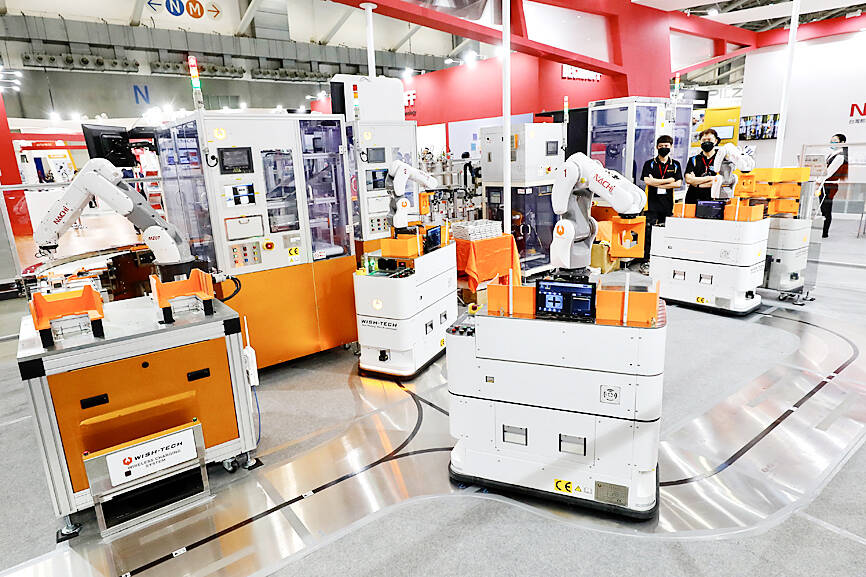The S&P Taiwan Manufacturing Purchasing Managers’ Index (PMI) last month rose to 49.0, from 44.3 in January, as the worst of inventory adjustments likely ended, as evidenced by improving demand from China following the lifting of its strict COVID-19 curbs.
The PMI pointed to a less serious deterioration in the operating conditions of manufacturers in light of subdued declines in output, new orders and input buying, S&P Global Market Intelligence said on Wednesday.
“The upward movement in the indices reflected improvements in demand at some firms, partly due to eased COVID-19 restrictions in China, and adds to hopes that the worst of the current downturn is now behind us,” company associate director Annabel Fiddes said in a statement.

Photo: Ritchie B. Tongo, EPA-EFE
PMI data aim to gauge the health of the manufacturing industry, with scores of 50 and higher indicating business expansion and values lower than that suggesting contraction.
Retreats in output and new orders subsided, and input purchases weakened at a softer pace, while supply chain pressures fell markedly from a year earlier, Fiddes said.
Production declined at the slowest pace in 10 months, while a retreat in total new business slowed from the beginning of the year, the report said.
Employment fell for the second month in a row, albeit only slightly, it said.
New orders fell at the slowest rate since May last year and only marginally, it added.
A downturn in new export business eased notably, with foreign sales shrinking only slightly, the report said.
Supply chain stress subsided and is close to stabilizing, with businesses reporting the slowest increase in delivery times in 43 months, it said.
Customer demand remained tepid, but some companies reported sales increases, especially from customers in China, the report said.
Still, companies were cautious about inventory management, but cost pressures increased in light of sharply rising input costs, the report added.
Nevertheless, businesses reduced selling prices to boost sales, it said.
“There still needs to be a meaningful increase in global demand to support a recovery in Taiwan,” Fiddes said.
Companies were not as downbeat in their business outlook for the year ahead as they were in January, but they still remain negative, she said, adding that a murky global economic outlook and stubborn cost pressures would continue to weigh on output projections.

BYPASSING CHINA TARIFFS: In the first five months of this year, Foxconn sent US$4.4bn of iPhones to the US from India, compared with US$3.7bn in the whole of last year Nearly all the iPhones exported by Foxconn Technology Group (富士康科技集團) from India went to the US between March and last month, customs data showed, far above last year’s average of 50 percent and a clear sign of Apple Inc’s efforts to bypass high US tariffs imposed on China. The numbers, being reported by Reuters for the first time, show that Apple has realigned its India exports to almost exclusively serve the US market, when previously the devices were more widely distributed to nations including the Netherlands and the Czech Republic. During March to last month, Foxconn, known as Hon Hai Precision Industry

Taiwan Semiconductor Manufacturing Co (TSMC, 台積電) and the University of Tokyo (UTokyo) yesterday announced the launch of the TSMC-UTokyo Lab to promote advanced semiconductor research, education and talent development. The lab is TSMC’s first laboratory collaboration with a university outside Taiwan, the company said in a statement. The lab would leverage “the extensive knowledge, experience, and creativity” of both institutions, the company said. It is located in the Asano Section of UTokyo’s Hongo, Tokyo, campus and would be managed by UTokyo faculty, guided by directors from UTokyo and TSMC, the company said. TSMC began working with UTokyo in 2019, resulting in 21 research projects,

Ashton Hall’s morning routine involves dunking his head in iced Saratoga Spring Water. For the company that sells the bottled water — Hall’s brand of choice for drinking, brushing his teeth and submerging himself — that is fantastic news. “We’re so thankful to this incredible fitness influencer called Ashton Hall,” Saratoga owner Primo Brands Corp’s CEO Robbert Rietbroek said on an earnings call after Hall’s morning routine video went viral. “He really helped put our brand on the map.” Primo Brands, which was not affiliated with Hall when he made his video, is among the increasing number of companies benefiting from influencer

Quanta Computer Inc (廣達) chairman Barry Lam (林百里) yesterday expressed a downbeat view about the prospects of humanoid robots, given high manufacturing costs and a lack of target customers. Despite rising demand and high expectations for humanoid robots, high research-and-development costs and uncertain profitability remain major concerns, Lam told reporters following the company’s annual shareholders’ meeting in Taoyuan. “Since it seems a bit unworthy to use such high-cost robots to do household chores, I believe robots designed for specific purposes would be more valuable and present a better business opportunity,” Lam said Instead of investing in humanoid robots, Quanta has opted to invest